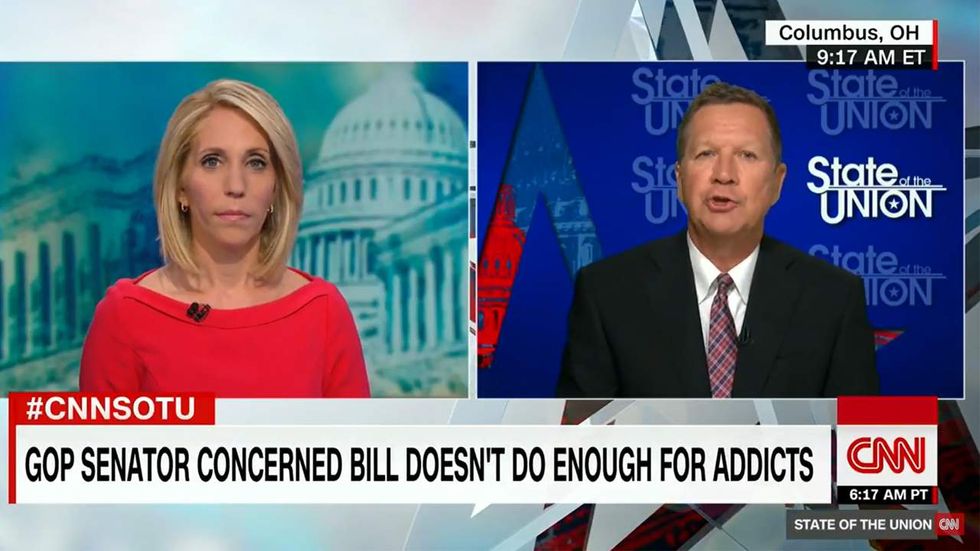
On June 25, 2017, Ohio Gov. John Kasich (R) told CNN's Dana Bash he opposes congressional Republicans' plan to replace the Affordable Care Act. (Image source: CNN/YouTube screenshot)

Ohio Gov. John Kasich (R) isn’t happy with congressional Republicans’ plan to replace the Affordable Care Act, but unlike many of the other GOP opponents of the legislation, Kasich’s problem with the Senate’s Better Care Reconciliation Act is not that it keeps too much of Obamacare in place; it’s that the legislation doesn’t spend enough government money.
In an interview with CNN’s Dana Bash on Sunday on “State of the Union,” Kasich said he’s “against” the BCRA, calling it not “adequate.”
“Unless it gets fixed, I would — look, I'm against it," Kasich told Bash.
Kasich isn’t the only Republican who is opposed to the Senate leadership’s plan. Sens. Rand Paul (R-Ky.), Ted Cruz (R-Texas), Mike Lee (R-Utah) and Ron Johnson (R-Wis.) announced on Thursday they don’t support the legislation in its current form because, as the senators said in a statement, “it does not appear this draft as written will accomplish the most important promise that we made to Americans: to repeal Obamacare and lower their health care costs.”
Unlike those conservative senators, some of whom would need to support the legislation for it to have any chance of passing in the Senate, Kasich said he has “deep concerns” about the bill because he believes it will take important government services away from people.
“I have deep concerns with the details of the U.S. Senate’s plan to fix America’s health care system and the resources needed to help our most vulnerable, including those who are dealing with drug addiction, mental illness, and chronic health problems and have nowhere else to turn,” Kasich said in a statement on Thursday.
On Sunday, Kasich continued this rhetoric when speaking to CNN, telling Bash, "My job, as I see my job as a governor of a state, not as a Republican governor, but the governor of this state, my job is to look not just today, but in the out-years, at the impact it's going to have on people who need help.”
In a particularly gross example of fear-mongering, Kasich suggested Republicans’ bill would hurt special-needs kids.
“Dana, I was at a restaurant on Friday, and I was at a Wendy’s actually,” Kasich said. “There was a partition and I looked over at the people that had gathered there, and there were about, I don’t know, 25 kids. All of them were here in Columbus for [the] Special Olympics. And I looked at them and I thought: Are these people being served? Are they going to be served by this bill in the future? My conclusion right now is ‘no.’”
Kasich said one of the bill’s biggest problems is that it phases out the ACA’s Medicaid expansion, which Kasich believes will hurt the hundreds of thousands of Ohioans who have signed up for Medicaid since Obamacare was first implemented.
Under the Senate’s proposed bill, federal funding for Medicaid expansion — which has allowed millions of people to enroll in Medicaid who previously weren’t eligible — would be cut back by 5 percentage points each year, beginning in 2020. In 2024, the federal share of Medicaid spending would be slashed significantly down to levels similar to what had existed prior to the ACA’s passage.
While some, including Kasich, have said this is a heartless move that will harm millions of people, conservative Republicans have said it’s a necessary step toward improving health care for all people.
First, conservatives have said the Affordable Care Act’s Medicaid expansion is unaffordable and unsustainable because it’s growing at a runaway pace. Under the ACA, newly eligible — not those who were previously eligible but didn’t sign up — Medicaid recipients would have at least 90 percent of their costs covered by the federal government indefinitely, incentivizing states to sign up as many newly eligible enrollees as possible. As a result, more than 16.7 million people have been added to Medicaid since September 2013, a massive increase, and more than 74 million people are currently enrolled.
Second, many of those newly eligible for Medicaid are able-bodied adults who might be able to pay for their own health care/insurance if more affordable options were permitted than those allowed under the ACA. Most children, disabled people and parents with multiple children — the people Kasich said he’s most concerned about — were already eligible for Medicaid if they needed it.
Third, Kasich and Democrats have said the Republicans’ bill will steal Medicaid away from people, but conservatives have said that’s not at all true. There’s absolutely nothing stopping states from paying for their own Medicaid programs. In fact, states could provide single-payer health care to all their residents if they so choose. Proponents of Medicaid expansion have said this claim is misleading because states don’t have any money to spare, but in actuality, the federal government is $20 trillion in debt and has for many years run annual deficits in the hundreds of billions of dollars, which means the federal government is beyond broke. However, nothing is stopping states from raising taxes or cutting spending in other areas to pay for Medicaid expansion.
Fourth, Medicaid is not high-quality health insurance. Medicaid is not accepted by many primary care doctors, waiting lists tend to be long in many areas and many specialists refuse to take Medicaid patients because reimbursement rates are too low.
Paul, Cruz, Lee and Johnson, as well as virtually every prominent conservative policy organization in the country, have said Americans shouldn’t believe the scare tactics promoted by politicians such as Kasich, and the evidence seems to be firmly on their side.
Justin Haskins